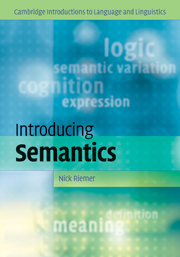Book contents
- Frontmatter
- Contents
- Note to the reader
- 1 Meaning in the empirical study of language
- 2 Meaning and definition
- 3 The scope of meaning I: external context
- 4 The scope of meaning II: interpersonal context
- 5 Analysing and distinguishing meanings
- 6 Logic as a representation of meaning
- 7 Meaning and cognition I: categorization and cognitive semantics
- 8 Meaning and cognition II: formalizing and simulating conceptual representations
- 9 Meaning and morphosyntax I: the semantics of grammatical categories
- 10 Meaning and morphosyntax II: verb meaning and argument structure
- 11 Semantic variation and change
- Glossary
- References
- Index
3 - The scope of meaning I: external context
Published online by Cambridge University Press: 05 June 2012
- Frontmatter
- Contents
- Note to the reader
- 1 Meaning in the empirical study of language
- 2 Meaning and definition
- 3 The scope of meaning I: external context
- 4 The scope of meaning II: interpersonal context
- 5 Analysing and distinguishing meanings
- 6 Logic as a representation of meaning
- 7 Meaning and cognition I: categorization and cognitive semantics
- 8 Meaning and cognition II: formalizing and simulating conceptual representations
- 9 Meaning and morphosyntax I: the semantics of grammatical categories
- 10 Meaning and morphosyntax II: verb meaning and argument structure
- 11 Semantic variation and change
- Glossary
- References
- Index
Summary
CHAPTER PREVIEW
Linguistic expressions can only occur in particular contexts; as a result, working out what role context plays in the determination of meaning is an important part of semantic analysis. This chapter considers one essential type of context: the external or real-world context to which linguistic expressions refer.
We begin by discussing an important distinction: the distinction between what a word inherently means, and what it can be used to mean in a particular context, showing that this distinction is often not self-evident. We then distinguish the different types of task a hearer must perform to correctly understand a linguistic expression in its context (3.1).
In 3.2 we begin the treatment of external context by considering the relation between sense and reference, discussing
the origins of this distinction in Frege;
its applications in linguistics; and
the nature of deictic expressions, which can be seen as a bridge between language and its surrounding external context.
In 3.3. we discuss, and reject, a possible distinction between knowledge of a word's inherent, linguistic meaning (dictionary knowledge) and knowledge of facts about the word's external context (encyclopaedic knowledge).
Meaning and context
For the purposes of deciding what a piece of language means, no utterance can be considered as a self-standing whole: words only exist within particular contexts, and we will not be able to achieve an adequate description of meaning if we don't take these contexts into account.
Information
- Type
- Chapter
- Information
- Introducing Semantics , pp. 87 - 106Publisher: Cambridge University PressPrint publication year: 2010
